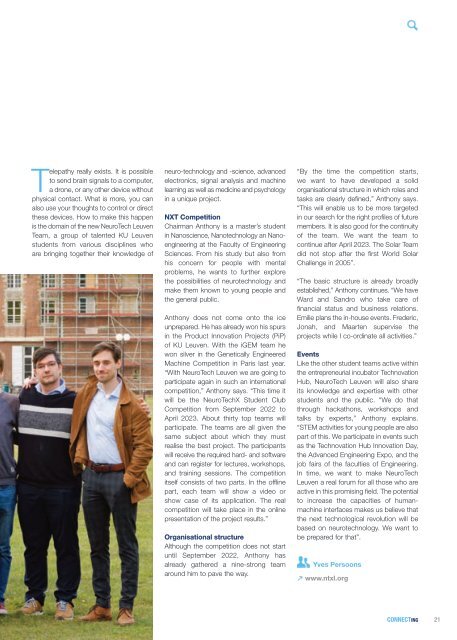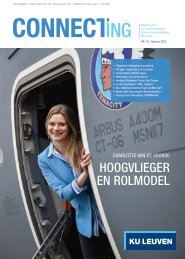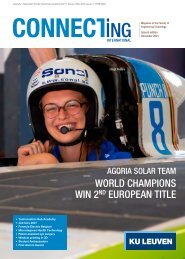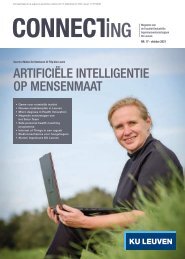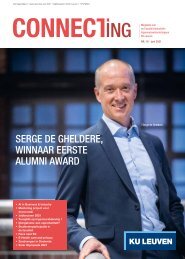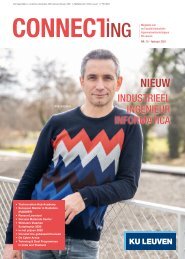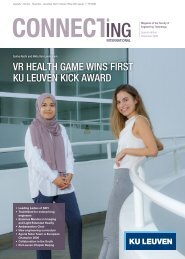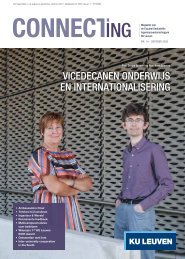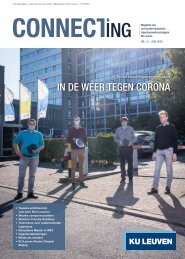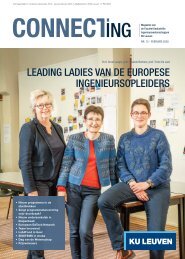ConnectING 19 juni 2022
Create successful ePaper yourself
Turn your PDF publications into a flip-book with our unique Google optimized e-Paper software.
Telepathy really exists. It is possible<br />
to send brain signals to a computer,<br />
a drone, or any other device without<br />
physical contact. What is more, you can<br />
also use your thoughts to control or direct<br />
these devices. How to make this happen<br />
is the domain of the new NeuroTech Leuven<br />
Team, a group of talented KU Leuven<br />
students from various disciplines who<br />
are bringing together their knowledge of<br />
neuro-technology and -science, advanced<br />
electronics, signal analysis and machine<br />
learning as well as medicine and psychology<br />
in a unique project.<br />
NXT Competition<br />
Chairman Anthony is a master’s student<br />
in Nanoscience, Nanotechnology an Nano -<br />
engineering at the Faculty of Engineering<br />
Sciences. From his study but also from<br />
his concern for people with mental<br />
problems, he wants to further explore<br />
the possibilities of neurotechnology and<br />
make them known to young people and<br />
the general public.<br />
Anthony does not come onto the ice<br />
unprepared. He has already won his spurs<br />
in the Product Innovation Projects (PiP)<br />
of KU Leuven. With the iGEM team he<br />
won silver in the Genetically Engineered<br />
Machine Competition in Paris last year.<br />
“With NeuroTech Leuven we are going to<br />
participate again in such an international<br />
competition,” Anthony says. “This time it<br />
will be the NeuroTechX Student Club<br />
Competition from September <strong>2022</strong> to<br />
April 2023. About thirty top teams will<br />
participate. The teams are all given the<br />
same subject about which they must<br />
realise the best project. The participants<br />
will receive the required hard- and software<br />
and can register for lectures, workshops,<br />
and training sessions. The competition<br />
itself consists of two parts. In the offline<br />
part, each team will show a video or<br />
show case of its application. The real<br />
competition will take place in the online<br />
presentation of the project results.”<br />
Organisational structure<br />
Although the competition does not start<br />
until September <strong>2022</strong>, Anthony has<br />
already gathered a nine-strong team<br />
around him to pave the way.<br />
“By the time the competition starts,<br />
we want to have developed a solid<br />
organisational structure in which roles and<br />
tasks are clearly defined,” Anthony says.<br />
“This will enable us to be more targeted<br />
in our search for the right profiles of future<br />
members. It is also good for the continuity<br />
of the team. We want the team to<br />
continue after April 2023. The Solar Team<br />
did not stop after the first World Solar<br />
Challenge in 2005”.<br />
“The basic structure is already broadly<br />
established,” Anthony continues. “We have<br />
Ward and Sandro who take care of<br />
financial status and business relations.<br />
Emilie plans the in-house events. Frederic,<br />
Jonah, and Maarten supervise the<br />
projects while I co-ordinate all activities.”<br />
Events<br />
Like the other student teams active within<br />
the entrepreneurial incubator Technovation<br />
Hub, NeuroTech Leuven will also share<br />
its knowledge and expertise with other<br />
students and the public. “We do that<br />
through hackathons, workshops and<br />
talks by experts,” Anthony explains.<br />
“STEM activities for young people are also<br />
part of this. We participate in events such<br />
as the Technovation Hub Innovation Day,<br />
the Advanced Engineering Expo, and the<br />
job fairs of the faculties of Engineering.<br />
In time, we want to make NeuroTech<br />
Leuven a real forum for all those who are<br />
active in this promising field. The potential<br />
to increase the capacities of humanmachine<br />
interfaces makes us believe that<br />
the next technological revolution will be<br />
based on neurotechnology. We want to<br />
be prepared for that”.<br />
Yves Persoons<br />
www.ntxl.org<br />
CONNECTING<br />
21


